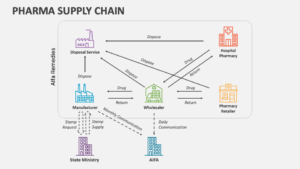Introduction
The pharmaceutical industry operates within a complex supply chain, connecting manufacturers, distributors, wholesalers, and pharmacies. Efficient supply chain management is critical for ensuring timely delivery of medications, maintaining product quality, and complying with regulatory standards. In this blog post, we’ll explore key strategies to optimize the pharmaceutical supply chain.
1. Demand Forecasting and Inventory Management

Accurate demand forecasting helps prevent stockouts and excess inventory. Implement robust inventory management systems that consider lead times, seasonality, and market trends. Maintain safety stock levels to handle unexpected fluctuations in demand.
2. Supplier Relationship Management
Strong relationships with suppliers are essential. Regularly assess vendor performance, negotiate favorable terms, and diversify your supplier base. Conduct risk assessments to identify potential disruptions and develop contingency plans.
3. Serialization and Track-and-Trace

Serialization involves assigning a unique identifier (serial number) to each drug package. Implement track-and-trace systems to monitor product movement throughout the supply chain. This enhances transparency, reduces counterfeiting risks, and ensures patient safety.
4. Regulatory Compliance
Compliance with Good Manufacturing Practices (GMP) and regulatory guidelines is non-negotiable. Regular audits, documentation, and adherence to quality standards are crucial. Non-compliance can lead to product recalls and legal penalties.
5. Cold Chain Management

Many pharmaceuticals require specific temperature conditions during storage and transportation. Invest in cold chain infrastructure, monitor temperature continuously, and train staff on handling temperature-sensitive products.
6. Technology Adoption
Leverage technology to enhance visibility and efficiency. Blockchain ensures data integrity, IoT devices track shipments, and supply chain analytics provide actionable insights. Stay informed about emerging technologies.
7. Sustainability Initiatives

Pharmaceutical companies are increasingly focusing on sustainability. Opt for eco-friendly packaging materials, minimize waste, and explore energy-efficient transportation options.
Conclusion
Efficient supply chain management in the pharmaceutical industry requires a holistic approach. By integrating technology, fostering strong supplier relationships, and prioritizing compliance, companies can navigate the complexities of the supply chain successfully.

